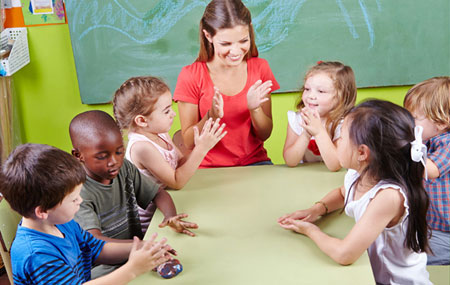Children develop socially as they gain experience, skills, and values that are useful in having meaningful interactions and relationships with others. We see social development in young children as they begin to understand the characteristics of positive friendships and how to get along with others. Because a child’s experience at school has a large impact on their social development, it’s important for teachers to talk about, model, and encourage positive social interactions. But what happens at home is just as important. Try these ideas to help guide your child to socialize in a polite, respectful way:
Infants:
- Manners – Talk to your child in a way that is characteristic of positive relationships. For example, use a kind tone and say “please” and “thank you” when asking questions or giving a response.
- Intentional Actions – Model behaviors you eventually want to see in your child. It could be as simple as waving to people to say hello or saying “good morning” and “good night” in conversation.
- Impactful Stories – When reading with your child, choose books that show kind, caring characters, and positive friendships.
Toddlers/Twos:
- Conversation – When talking to someone, encourage your child to address them by their name.
- Playtime – Encourage your child to be respectful when playing with other children. Give your child positive reinforcement when they play without disrupting or destroying the work of others.
- Speaking Up – Encourage your child to use words such as “stop” or “no” when someone is doing something they don’t like. Talk to your child about how it is better to use words than to hit.
Preschool/Pre-K:
- Empathy – Model the caring and empathetic behavior you want your child to learn. For example, hug someone if they are sad and tell your child why this is a kind thing to do.
- Interactions – Model the words your child can use when they want to join a group play activity. For example, “I see you want to play tag with your cousins. You can go ask to join the game.”
- Sharing Ideas – When your child has play dates, encourage them to ask their friend if they would like to do a certain activity or play a certain game rather than telling them.
Kindergarten:
- Confidence – Encourage your child to be the first to greet a friend when they see them. This can be done by modeling this behavior and by providing positive feedback when your child does this.
- Express Interest – Talk to your child about their friends. Ask them questions about their friends’ personalities and interests. Emphasize that when you are friends with someone, it’s important to learn about them and take part in their interests.
- Conflicts – When your child has a conflict with a peer or sibling, allow them the opportunity to resolve it on their own. If the problem persists, ask your child if you can help in any way.
Rising Stride Child Care Centers is a great way for parents to get their kids the care they need while also teaching them new skills, allowing them to explore, make friends and helping them develop their skills. To get your child engaged in a great environment, check out our programs and schedule a tour today.

